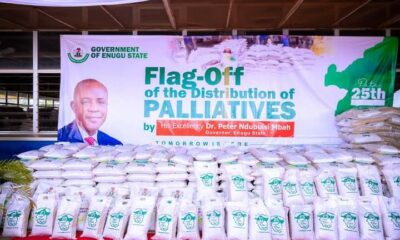Energy
Nigeria’s electricity down by 3,036MW


Nigeria loses 3,036 megawatts of electricity as six gas-fired power generation plants have not been able to generate electricity to the national grid as a result of operational challenges and gas supply constraints, a daily operational record for July 21, from the Office of the Vice President, Yemi Osinbajo, has shown.
As the power sector contends with the challenges of inadequate supply of gas and other operational challenges, the 11 electricity distribution companies (Discos) yesterday claimed that they lose an average of N48 from every kilowatt hour (kWh) of electricity they distribute because of the non-review of electricity tariffs in the past 30 months.
The power plants, which do not have gas to operate were the 634.5 megawatts (MW) Calabar National Integrated Power Project (NIPP) plant built in the Odukpani area of Cross River State by the Niger Delta Power Holding Limited (NDPHC); 754MW Olorunsogo NIPP plant; and 504MW Alaoji NIPP plant.
According to the record, the three plants could not generate 230MW; 360MW; and 360MW respectively.
However, the reasons for the shutdown of three other plants – 270MW AES power plant; 180MW Rivers IPP and ASCO plant were not stated.
Other plants such as the Omoku in Rivers State; Omotosho NIPP in Ondo State; Geregu NIPP in Kogi State; Omotosho II; Olorunsogo in Ogun State; Geregu 1; Afam VI; Azura Edo; Egbin in Lagos State; Delta; Shiroro; and Jebba had challenges of gas, and water, as well as frequency constraints.
For the period under consideration, the record indicated that these constraints prevented the generation of 3,036MW of power, while only 3,399MW was available to the grid.
It further explained that 1,664MW was not generated due to unavailability of gas, 1,293MW due to frequency constraints, 39.4MW due to unavailability of transmission infrastructure, and 40MW due to water management issues.
Further the record showed that for the period, Delta; Egbin; Shiroro; Azura Edo; Afam VI; Geregu; Olorunsogo; and Omotosho NIPP plants could not generate 431.25MW; 445.66MW; 230MW; 211MW; 225MW; 168MW; 140MW; and 120MW respectively because of frequency constraints.
Also, the Jebba power plant could not generate 40MW because of water management, while Olorunsogo; Omotosho; Geregu and Omotosho NIPPs lost 152MW; 152MW; 145MW; and 120MW respectively on account of gas constraints even though they were operational.
Equally, Ibom power plant could not generate 39.4MW because of line constraints.
“On July 21, 2018, average power sent out was 3,399MWh/hour – down by 81MWh/h from the previous day. 1,664MW was not generated due to unavailability of gas. 39.4MW was not generated due to unavailability of transmission infrastructure, while 1,293MW was not generated due to high frequency resulting from unavailability of distribution infrastructure. 40MW was recorded as losses due to water management. The power sector lost an estimated N1, 457,000,000 on July 21, 2018 due to insufficient gas supply, distribution infrastructure and transmission infrastructure,” said the report.
It further explained: “On July 20, 2018, average power sent out was 3,480MWh/hour – down by 381.22MWh/h from the previous day. 1,626MW was not generated due to unavailability of gas. 196.6MW was not generated due to high frequency resulting from unavailability of distribution infrastructure. 160MW was recorded as losses due to water management.
“The power sector lost an estimated N1,432,000,000 on July 20, 2018 due to insufficient gas supply, distribution infrastructure and transmission infrastructure. The dominant constraint on July 20, 2018 remained unavailability of gas – constraining a total of 1,626MW from being available on the grid.”
Meanwhile, the 11 electricity distribution companies (Discos) yesterday claimed that they lose an average of N48 from every kilowatt hour (kWh) of electricity they distribute because of the non-review of electricity tariffs in the past 30 months.
According to a statement from their umbrella body – the Association of Nigerian Electricity Distributors (ANED) – in Abuja, the loss started from February 2016.
ANED said the suspension of the review of tariffs, which ought to be done every six months by the Nigerian Electricity Regulatory Commission (NERC), had added to the performance issues in the sector it described as being capital-intensive.
“Through the regulatory and policy actions that have been principally driven by the minister, the Discos have been forced to sell their product which should retail for an average retail tariff that is more than N80/kWh, at an average retail price of N32/kWh,” ANED said in the statement.
It further claimed that a government agency like the Rural Electrification Agency (REA) was using tax payers’ funds to do three megawatts (MW) project in Sokoto at $5.6 million per megawatts; and $2.02 million for a two megawatts project in Anambra.
“It is remarkable because the government has robustly challenged, as exorbitant, the proposed price of $1.5m/MW put forward by power developers from the private sector and sought a reduction of same,” the Discos claimed.
“While we acknowledge and are sympathetic to the government’s challenge of maintaining the balance between the myriad of its obligations and its fiscal constraints, continued failure to address this pricing gap means that we will only arrive at, and continue to exist in our current situation – N1.3 trillion of market shortfall and growing; absence of the pricing signal that will grow electricity supply along the NESI value chain,” the Discos added.
ANED said Nigerians were not getting value for taxpayers’ funds being channelled to misguided projects by REA, and the Transmission Company of Nigeria (TCN).
It said: “Should the unserved rural dwellers, who should be legitimate beneficiaries of REA’s funding and services, continue to live in darkness, due to the ministry’s and REA’s misguided priorities?
“Should TCN, an entity without a distribution licence, continue to engage in opaque ‘eligible customer’ transactions, rather than investing its limited funding in expanding and stabilising the grid, for increased energy to our customers?” the companies queried. (THISDAY).
Energy
AVEVA Appoints Joanna Mainguy as New Sustainability Accelerator Director


- Joanna Mainguy will steer strategies for sustainability innovation across AVEVA’s portfolio and partner ecosystem, furthering ESG targets for 2025 and beyond
AVEVA, a global leader in industrial software, driving digital transformation and sustainability, today announced the appointment of Joanna Mainguy as Sustainability Accelerator Director.
Joanna’s appointment testifies to AVEVA’s dedication to strengthening the company’s sustainability impact in line with advancing global climate commitments.
As Sustainability Accelerator Director, Joanna Mainguy will focus exclusively on sustainability solutions and strategies to accelerate innovation that will help AVEVA’s customers to achieve their net-zero targets.
She will look at how AVEVA leverages current market and customer analysis to inform its in-house development team, advise on new customer collaborations and on how AVEVA should grow its partnership network and M&A pipeline to reflect its sustainability priorities.
Joanna will lead the implementation of a sustainability solutions plan tailored to meet the most pressing needs of AVEVA’s industrial customers on low-carbon transition, circularity and resilience, via an integrated product, marketing and sales approach. She will work closely with AVEVA’s portfolio, business area and R&D leads to continue to develop new sustainability capabilities and drive collaboration on go-to-market initiatives that support industry with contributing to an accelerated energy transition and shift to a circular economy.
Joanna was formerly Industry Director, EMEA, for Energy & Sustainability at Microsoft, where she led strategic engagements with major energy providers and supported the energy transition with digital solutions. She has worked across the entire energy value chain and has more than 15 years of experience in process industries and the energy sector, including work for major system integrators, software and energy companies.
Lisa Wee, Global Head of Sustainability, AVEVA, said: “We are excited to welcome Joanna to AVEVA. She will bolster our mission to enable faster uptake of existing sustainability solutions across the industrial landscape, while in parallel we continue to invest in product capabilities and partnerships that will push out the frontiers of sustainability innovation for industry. At AVEVA we look to lead by example on sustainability and we achieved a 93% reduction in Scope 1 and 2 emissions last year. We aspire to help our customers better leverage digital solutions to realize their own ambitious sustainability targets early, and Joanna brings a wealth of experience to help support this.”
Commenting on her appointment, Joanna Mainguy, Sustainability Accelerator Director, AVEVA, said: “I am delighted to join AVEVA at such a pivotal time in its sustainability innovation and growth trajectory. I look forward to working with AVEVA teams and customers to continue to grow the sustainability benefits that can be achieved with AVEVA software. I am also keen to work closely with our partners to drive further positive change at scale, since we know addressing the climate crisis will continue to require expanded collaboration”.
AVEVA actively embeds sustainability into its core product strategy with specific capabilities in its software portfolio.
AVEVA’s software enables organizations to connect and contextualize key sustainability data with artificial intelligence and human insight, enhancing their agility, resilience and sustainability in order to help drive responsible use of the world’s resources.
AVEVA’s 2023 Sustainability Progress Report reveals significant progress across all three pillars of the company’s sustainability framework, encompassing product strategy, operations and culture.
Energy
Climate Change: NNPC Ltd/Total Energies JV Achieves Zero Gas Flare



In pursuit of meeting the targets of 20% (unconditional) and 47% (conditional) greenhouse gas emission reduction as contained in the Nationally Determined Contribution under the Paris Accord signed by the President Bola Ahmed Tinubu administration, the NNPC Ltd/TotalEnergies Joint Venture has achieved zero routine gas flare in all its assets.
According to a statement signed by Olufemi Soneye, Chief Corporate Communications Officer, NNPC Ltd., this feat was announced on Thursday during an inspection tour of OML 100 in South-eastern Niger Delta, off Port Harcourt, by a joint NNPC Ltd and TotalEnergies Team to ascertain the success of the OML Flare Reduction Project launched in December 2023.
The NNPC Ltd/TotalEnergies Joint Venture, which is the concession holder of four leases, had hitherto achieved zero routine flaring across OML 99 (2006), OML 102 (2014), and OML 58 (2016), leaving OML 100 as the only lease with routine flaring going on.
The significance of this achievement is that the last routine flare volume of about 12MMscf/d (twelve million standard cubic feet per day) of gas has now been eliminated giving rise to a greenhouse gas emissions reduction of about 341KtCO₂e/yr.
The achievement is an outcome of a programme introduced by the NNPC Ltd to galvanize action towards achieving the zero routine flare by 2030 across its portfolio of assets.
It is also a testament to NNPC Ltd’s prioritization of sustainability anchored on the ‘first R’ of its 5R Strategy (Reduce, Replace, Renew, Re-plant, Repurpose), as it strives to reduce its carbon footprint.
Work is ongoing across all other assets within NNPC Ltd’s Upstream Directorate to ensure that all assets achieve zero routine flaring by 2030 or earlier.



In line with President Bola Ahmed Tinubu’s directive to the Nigerian National Petroleum Company Limited (NNPC Ltd) to optimise production from the nation’s oil and gas assets, the Company has announced the successful commencement of oil production from the Akpo West Field.
The milestone, which is the result of meticulous planning, strategic collaboration, and unwavering dedication from all stakeholders involved in the project, will add 14,000 barrels per day condensate to the nation’s production. This will be followed up by the production of about 4million cubic meters of gas per day by 2028.
The development of Akpo West which is on Petroleum Mining Lease (PML) 2 (formerly OML 130) leverages the existing Akpo Floating Production Storage and Offloading (FPSO) facility via a subsea tie-back to keep costs low and minimize greenhouse gas emissions.
The milestone was enabled by the strategic leadership of the Group Chief Executive Officer (GCEO), Mr. Mele Kyari, and the Upstream Directorate of the NNPC Ltd whose support played no small role in propelling the operators to actualise the short- and mid-term hydrocarbon production goal of the President Tinubu administration.
Located 135 kilometres offshore, Akpo West is one of the discoveries on PML 2 with proximity to the Akpo main which started up in 2009 and produced 124,000 barrels of oil equivalent per day in 2023.
PML 2 is operated by TotalEnergies with a 24% interest, in partnership with CNOOC (45%), Sapetro (15%), Prime 130 (16%), and the Nigerian National Petroleum Company Ltd as the concessionaire of the Production Sharing Contract (PSC).
-



 Tech3 days ago
Tech3 days agoAnambra School Emerges Winner In National Girls In ICT Competition With Groundbreaking VR Technology
-



 News3 days ago
News3 days agoNiger State Prisoners Run From Facility After Rainstorm Brings Down Part Of Fencing
-



 Spotlight3 days ago
Spotlight3 days agoNigerian Woman Breaks Guinness World Record With 55-Hour Interview Marathon
-



 Politics3 days ago
Politics3 days agoEnugu State Government Flag Off Palliative Distribution In The State
-



 Finance4 days ago
Finance4 days agoGodwin Emefiele Disobeyed Direction Of Law With Intent To Harm The Public, He Printed ₦684.5M Using ₦18.9B Says EFCC in fresh charge
-





 News2 days ago
News2 days agoEFCC: New Documents Extracted Shows Yahaya Bello Allegedly Paid School Fees To The Tune Of $845,852,84 For His Family Members
-



 News23 hours ago
News23 hours agoKing Charles Reportedly “Really Unwell” And Funeral Plans Are Currently Being Reviewed
-





 News5 days ago
News5 days agoEFCC: Former Governor Of Kogi State, Yahaya Bello Fails To Show Up In Court, Says He Is Scared Of Arrest







